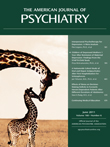Children of parents with major depressive disorder are at high risk for developing major depressive disorder as well as anxiety, disruptive disorders, attention deficit hyperactivity disorder, and substance abuse (
1,
2). The higher prevalence of these disorders in children of parents with major depressive disorder may be attributable to genetics, but other factors, such as living with a depressed parent or being exposed to negative events frequently observed in these families (e.g., chronic conflicts, socioeconomic difficulties, or abuse), may also increase the risk for developing psychopathology or functional impairment in children. Therefore, successful treatment of parents may ameliorate or even prevent the development of psychopathology in their children.
In a study reported in this issue, Wickramaratne and colleagues (
3) sought to evaluate whether the response to treatment with citalopram in depressed mothers who participated in the Sequenced Treatment Alternatives to Relieve Depression (STAR*D) study affected the psychopathology and functioning of their children. The authors evaluated threshold or subthreshold psychiatric symptoms in 80 children, ages 7–17, as measured by the screening interview of the Schedule for Affective Disorders and Schizophrenia for School-Age Children–Present and Lifetime Version. The number of symptoms was collected at baseline and at 3-month intervals for 1 year after the mother's remission or for 2 years if the mother did not remit. The interviewers were blind to each mother's remission status, and they interviewed mothers and children separately. In addition, the Child Behavior Checklist and the Children's Global Assessment Scale were used to assess each child's general psychopathology and functioning, respectively. Remission in mothers was defined as having a Hamilton Depression Rating Scale score below 7.
Wickramaratne and colleagues compared the symptoms and scores of children of early remitters (remitting within 0–3 months; N=36), late remitters (3–12 months; N=28), and nonremitters (N=16). After adjusting for potential confounders (e.g., the child's treatment and demographic characteristics and the mother's baseline depression, comorbid disorders, income, and marital status), the total count of psychiatric symptoms and internalizing scores of the Child Behavior Checklist showed significant improvement in children of early- and late-remitting mothers 1 year after the mothers' remission. The total Child Behavior Checklist problem and externalizing scores decreased only for the children of early-remitting mothers. Except for an increase in externalizing Child Behavior Checklist symptoms, children of nonremitting mothers did not show significant changes in their psychopathology. Children's functioning improved only among children of early-remitting mothers.
A previous analysis of the same sample examining the effects of mothers' time to remission on children's psychopathology after the initiation of maternal treatment showed similar results (
4). Another report showed that after 3 months of antidepressant treatment, the mothers' remission was significantly associated with reductions in the children's diagnoses and symptoms (
5). Importantly, children who were asymptomatic at the initiation of treatment were significantly more likely to develop symptoms if their mothers did not remit.
These and other studies (
6) provide evidence that treatment of parents' depression is associated with improvement in children's symptoms and functioning. However, to better inform clinical practice, future studies should include larger samples in order to be able to evaluate the maternal, childhood, and environmental factors associated with children's outcome and the mechanisms by which maternal remission leads to improvement or prevention of psychopathology in children (
6). In addition, obtaining data from collateral informants (e.g., teachers and healthy relatives), evaluating the impact of fathers' psychopathology on the children, and examining whether diverse types of treatment have differential effects on the children are warranted.
The effects of maternal depression on children's depressive symptoms have been further supported by several studies, including prevention and psychosocial randomized controlled treatment studies for youths who have subsydromal or syndromal depression or who are at high risk for developing depression because of a family history of depression. These studies have consistently shown the efficacy of cognitive-behavioral therapy (CBT) for the prevention and treatment of depression in youths (
7,
8). However, when the mother was depressed, CBT was no more efficacious than control interventions.
In contrast to observational studies such as the one by Wickramaratne and colleagues reported here, controlled studies in which the parents may be randomly assigned to an active treatment, placebo, or treatment as usual may shed light on the mechanisms or causal effects of a mother's remission and her child's outcome. A recent study of this sort (
9) showed that depressed mothers who received interpersonal psychotherapy responded better than those who received treatment as usual. Maternal response was associated with and preceded the child's improvement, suggesting a causal effect. However, further randomized controlled studies with larger samples are necessary.
Independent of the mechanism, these studies support observations that early identification and successful treatment of mothers with depression are crucial for their children's well-being. The earliest possible identification is best, since maternal depression during the child's first year of life has been associated with subsequent child psychopathology (
10). Clinicians who work with depressed parents, as well as clinicians who work with children, should be alert to these issues, inquire about the mental health of children and parents, and make appropriate referrals for treatment. This approach not only may increase the likelihood that the child's psychopathology will be identified and successfully treated, but may even prevent the development of psychopathology in the child. This is particularly important in light of evidence that depressed mothers do not seek treatment or delay their own treatment until after the treatment of their children (
11,
12). This creates a vicious circle in which the mothers' untreated symptoms and consequent impairment in functioning negatively affect their children (
11,
13). As suggested by Wickramaratne and colleagues (
3), continuing to treat depressed mothers until remission may be warranted, since even later remission decreased their children's psychopathology. Facilitating treatment of mothers (and possibly fathers) is a critical step in the prevention of the generational transmission of mental illness.

